Comments
ERIC PREVEN’S NOTEBOOK - Council President Marqueece Harris-Dawson CD8 referred to Friday, as the latest "day of presentations" at City Hall featuring, everything from a Fernandeño Tataviam blessing to Claw: Citizens for California Wildlife which happens to be packed full of former staffers. There were goodbyes to longtime housing paperwork veterans, Ann Sewill and Doug Guthrie and a warm hello to France’s Consul General in LA… let the Conflict games begin!
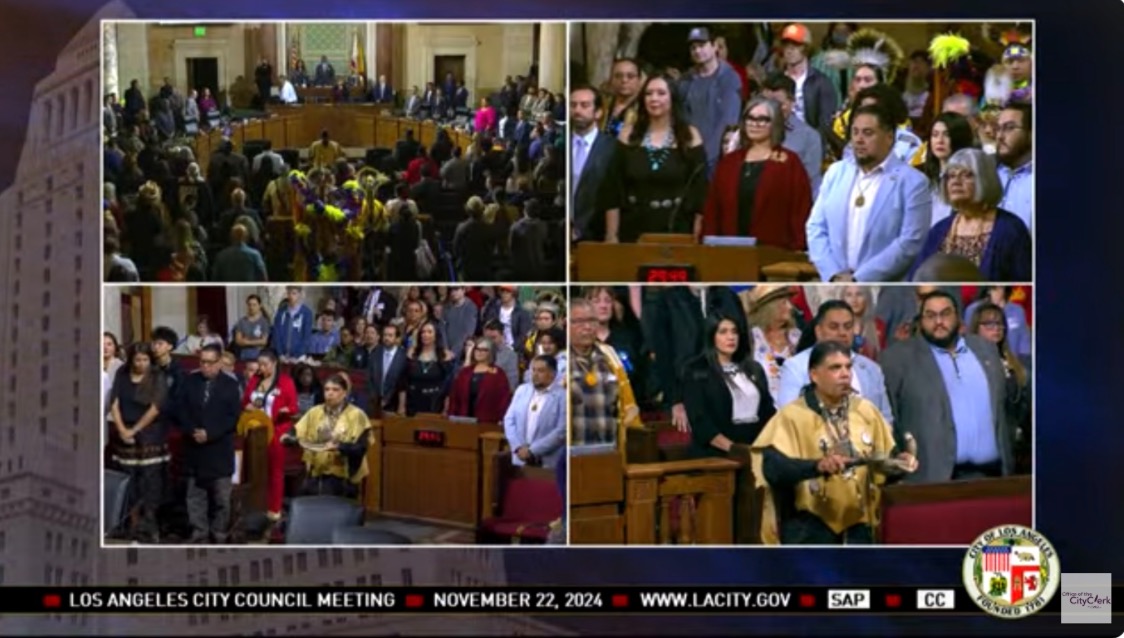
Four-camera coverage of Indigenous presentation. Too bad there is no regular land acknowledgment.
Nithya Raman CD4 tried to spin the looming expiration of 6,000 affordable housing units by 2027 as an opportunity. She was ighlighting a county pilot program that stabilized 110 tenants while cutting production costs by 47%. Admirable, but let’s be honest: finding property owners willing to sell at less than top dollar is as rare as spotting a four-leaf clover. Most landlords will hold out for maximum profit, and this reality undermines my enthusiasm…for such programs. But go for it!
Councilmember Harris-Dawson compared Sewill and Guthrie collectively our Housing brain trust to the efforts of first responders running into fires. Though to be fair their success has been contingent on massive infusions from the American Rescue Plan—one-time funds that won’t sustain future housing initiatives. Measure ULA's community land trust aspirations offer potential, but who will manage it effectively —
Sir, your time has expired.
Finally, let’s address the cultural performances and land acknowledgments that have become routine at the City Council. While these gestures honor history, they exclude everyday Indigenous voices—the braves and squaws not seated at the powwow table. A real commitment to inclusion would elevate all voices, not just those of big chiefs.
That said, we were happy to see the Consul general from the nation that hosted the Olympics and our elected officials who have rededicated their mission to mega-event activities. All city agendas should be provided in French —
We interrupt this Presentation with the public comment:
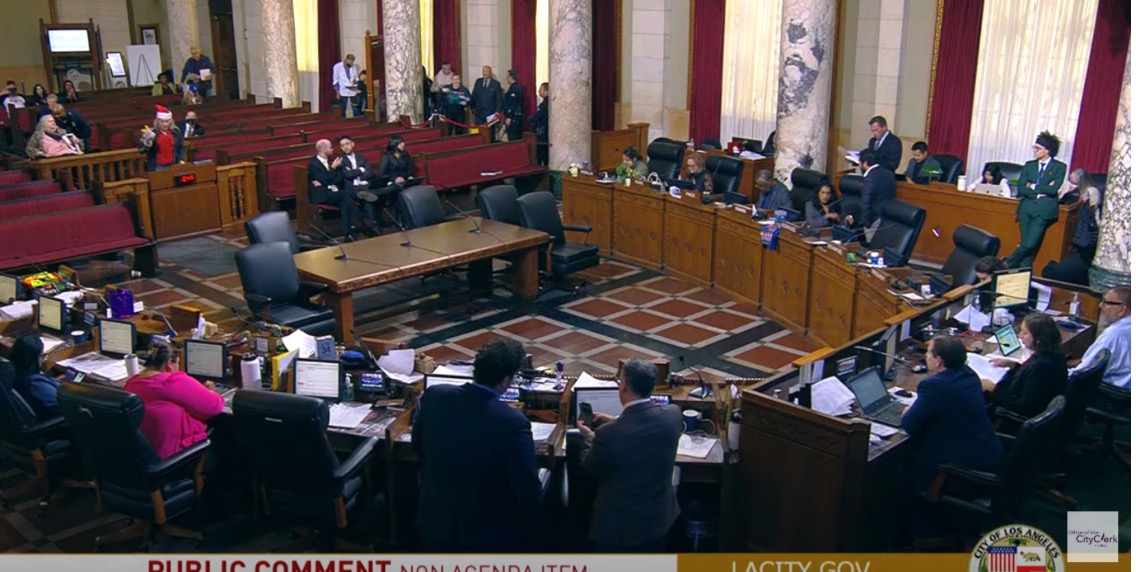
Progressive Marqueece Harris-Dawson fights to keep the unauthorized Puppets... invisible.
Senator Grabner: Marqueece, needs to stop lowering my hand on the phone every time I call in my hand is lowered. Why does my hand keep getting lowered? You need to do something about that —
City Clerk: Speaker with the last four digits, 2616, please state your name and the items you would like to speak to.
Smart Speaker: It's Eric Preven. I’d like to speak on items 5, and
6 and a general public comment.
City Attorney, Strefan Fauble: Mr. Preven, all we have available is one minute of general public comment. So you have a minute.
Smart Speaker: Point of order, he just asked me what items I wanted to speak on. Was that just to lather me up and then shut me down?
City Attorney, Strefan Fauble: I'm sorry that you were lathered up. You have a minute. Please go ahead.
Smart Speaker: Alright, well. I don't disagree with Senator Grabner that the lowering of the hands is creepy, Mr. Harris-Dawson, and if you think you’re going to get away with it, you need to look twice. You’ve got to tighten up your protocol so it's fair and reasonable. Item number 5, I was thrown because it's a police garage activity item, which is not pleasant for a progressive group, but it’s run by a guy named Moshe Dayan, who was an Israel retaliationist from years ago - he was sort of hero for some people, and a scoundrel for others. But very interesting. I don’t think there’s any relation, I tried to do a look-see. I would suggest that when you have presentations like this, today, you should put them on an agenda so we can review them like at the County Board of Supervisors. And I would also suggest that when you have the public speakers on camera, they should appear the same size as the Indigenous people who were honored today alongside Alison Simard.
The public must be visible to the public, Fauble. That includes you. Good to have —
City Attorney, Strefan Fauble: Thank you, Mr. Preven.
Majestic Scavengers:
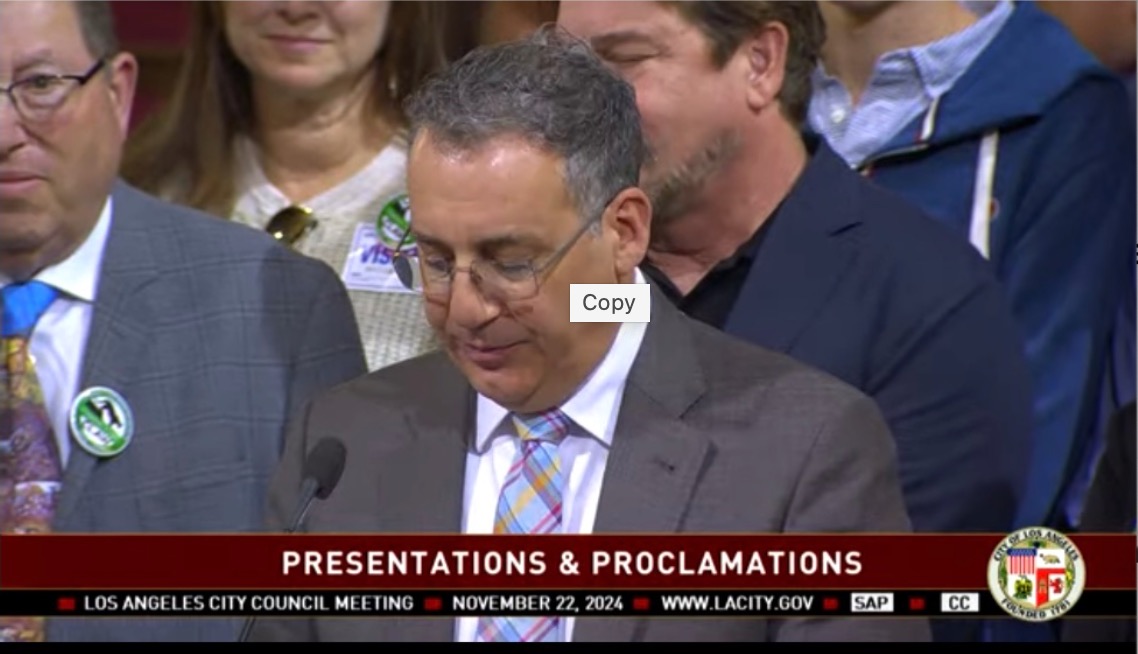
"Koretz, finked out" but Bob Blumenfield helped with a CLAW award. #BlumenfieldKnows ![]()
Studio City has become a battleground for misplaced priorities, and the ironies are piling up. Nithya Raman (CD4), Paul Krekorian, and Adrin Nazarian (CD2) have all championed a $30 million net-zero building project—right in our open space park. For what? A high school basketball facility. Not kidding. This comes on the heels of Harvard Westlake ramming through their plan to turn Studio City’s indigenous golf and tennis grounds into another massive athletic complex—billionaire-funded, of course. And for the same ballpark price range as the practice facility for USC.
In August, Harvard Westlake "scraped" Weddington bare, displacing wildlife with the promise that they could retreat to the Zev Greenway. But the MRCA had other plans, launching heavy construction at "The Zev Greeway" during peak nesting season. The result? Vulnerable animals are left with nowhere to go. A tragic, shameful failure of environmental stewardship.
And then there’s Paul Koretz (former CD5), the self-proclaimed animal rights crusader. Instead of delivering real results for domestic animals, he backed the launching of CLAW—Citizens for Los Angeles Wildlife, Inc.
Smart Speaker: Inc.?
The group came down to honor Koretz and the horse he rode in on, wildlife champion, Alison Simard. These two learned long ago that fighting for wildlife is an excellent way to canoodle with rich donors. Bobcats, it seems, are easier to protect than addressing affordable housing. Even Katy Yaroslavsky (CD5) was willing to take on Bulgari’s upscale resort plans to protect the little critters.
Smart Speaker: Why didn’t Nithya Raman (CD4) block Paul Krekorian’s dream of paving paradise to send his kids to Garcetti's alma mater? [Oh no he didn't!] [Yes, he did.]
Sir, you are off topic and Katy loves wildlife. Next!
And Koretz will forever be remembered for his locking arms with David Ryu—an outspoken Harvard Westlake cheerleader. Koretz shocked the entire region by refusing to engage with the Studio City Neighborhood Council’s government affairs committee on the City's proposed Ethics Ordinance. When we reminded him repeatedly, that “it’s easy to raise $25,000” if you’re friends with Zev Yaroslavsky and represent wealthy hillside dwellers, Koretz…well, he “finked out.”
Meanwhile, Mayor Bass’s Animal Services Department continues to flounder. Euthanasia rates for dogs have spiked 72% this year, and shelters remain so underfunded and mismanaged that animals suffer long-term confinement, neglect, and behavioral decline. Thirty million dollars—the same cost as the net-zero basketball facility—pales in comparison to the $1.9 billion lavished on LAPD.
Smart Speaker: Thirty million is the cost of the net-zero basketball court?
“I tried to Speak” @Exclusive City Council Mtg:
Doug Haines: I’m Doug Haines. I waited over two hours. East Hollywood has been ground zero for density bonus projects, and subsequently, East Hollywood experienced the highest population loss in the last census. Almost 7,000 poor residents were forced out.
Now, we are under siege with (ED1) projects, which are affordable in name only. Moderate-income tenants can make up to $117,000 a year, and a studio apartment can rent for up to $1,750 a month. No one in my neighborhood can afford that.
R1 zones are exempt from ED1 projects—that’s 72% of LA. The housing element would further exempt six community plans and seven CPIOs. People fear that what remains will lose the existing affordable housing and drive the poor out. Those fears are real.
Smart Speaker: Euthanasia rates for dogs have spiked 72% this year
If you are serious about providing affordability, include an inclusionary housing requirement of 15% affordable in all projects. I tried to speak on Tuesday, but myself and others could not get into the meeting. I hope that when this actually comes back, you will open it up for public comment.”
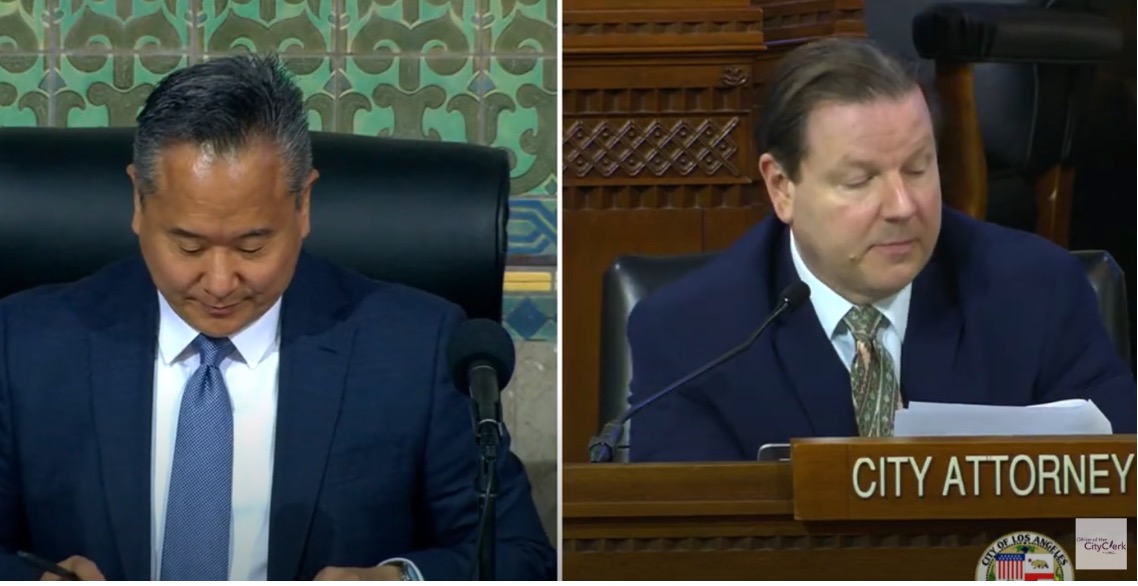
Staffer B John Lee and City Attorney Strefan Fauble take a brief nap in a nice two-shot.
Survival of the Fittest—or Lamest—at Mar-a-Lago
Since Donald Trump’s reelection, Mar-a-Lago has become the ultimate proving ground for the politically ambitious and socially shameless. The Florida resort, once scorned by Palm Beach elites, now serves as a three-ringed circus where administration hopefuls, celebrities, and loyalists compete to secure their place in Trump’s power-packed circle. Insiders describe the atmosphere as "Game of Thrones meets Hunger Games," but to me, it’s seems like a wildlife sanctuary on the great plains of Africa—complete with observation decks and salt licks to lure the lions, cheetahs, rhinos, and the gazelles. Each species circles the watering hole, eyeing the competition, waiting for the perfect moment to pounce—or retreat.
Figures like Elon Musk, Sebastian Gorka, and Javier Milei stalk the grounds, mingling with the glitterati at CPAC investor dinners and America First galas. Trump’s selection process for his administration mirrors the natural order: loyalty and spectacle dominate, while experience and nuance are often left to wither. The lions—those bold enough to roar—are rewarded with positions of power, while the gazelles, delicate but swift, hope to avoid becoming collateral damage in this Darwinian spectacle.
For his base, Mar-a-Lago represents a new Camelot, a sanctuary of strength and vision. For detractors, it’s a gilded echo chamber where the fittest—or at least the most entertaining—survive.
But here’s the twist: Mar-a-Lago isn’t the untamed wild. It’s really more like a circus. The performances are dazzling, but the performers are all on short leashes, dancing to the tune of a single ringmaster.
Survival isn’t just about strength—it’s about knowing when to bow.
Injustice — for SALE!
In America, justice is a commodity, and this week’s headlines prove it: Mark Ridley-Thomas’s polished appeal hearing, Donald Trump’s latest legal escape, and Jussie Smollett’s overturned conviction. These cases, disparate in detail, reveal a grim truth—wealth and influence tilt the scales, leaving accountability as a privilege for the few.
Ridley-Thomas, a once-dominant figure in Los Angeles politics, stands accused of public corruption that would have destroyed an average citizen. His defense hinges on the claim that $100,000 funneled through USC to his son wasn’t bribery but poor optics. With a high-powered legal team, he’s turned a straightforward indictment into a nuanced debate on policymaking ethics, raising the question: how can it be bribery if he didn’t personally profit?
Then there’s Donald Trump, the ultimate legal Houdini. A convicted felon by some measures, he uses delay tactics and political theater to turn his legal battles into a rallying cry. Now poised for a White House comeback, Trump exploits the system’s loopholes, using public office not just as a platform but as a shield from accountability.
And Jussie Smollett—his hate crime hoax wasn’t just a lie; it was a betrayal. His fabricated story squandered resources undermined real victims, and divided the nation. The Illinois Supreme Court’s ruling voiding his second prosecution may have upheld legal principles, but it left a stain on public trust and the fight against hate crimes.
These cases expose a system that bends to those who can afford the best defense. For the wealthy, justice becomes a drawn-out chess game; for everyone else, it’s swift and unforgiving. The price of this imbalance isn’t just cynicism—it’s the erosion of trust in the system itself. In a society where money talks, justice too often whispers.
A County Board Meeting arrives after weeks of self-serving cancellations:
A dense supplemental agenda on what must be a 15-page green sheet on top of a 69-page agenda —
Item 5: Revised to include verbal report updates on LAHSA audit findings and Measure A implications at the November 26 meeting.
Item 12: Revised for enhanced care mgmt services for justice-impacted individuals, including contract flexibility and oversight adjustments.
Item 19: Establishment of a Governance Reform Task Force to ensure transparency + accountability in LA County, reflecting Measure G goals.
Item 21: Feasibility study for a new department focused on homelessness services, with an estimated high-level transition schedule.
Item 53: Status report on a global plan for probation department’s halls and camps postponed to February 11, 2025.
Item 17: Governance Reform Task Force to implement Measure G, requiring a 15-member team to assess governance and service improvements.
Supervisor Holly J. Mitchell’s motion might be aiming for transparency, but with nine pages of dense prose buried among 70 other agenda items on the Tuesday before Thanksgiving, it feels It’s almost poetic that Supervisor Holly J. Mitchell’s nine-page motion about governance reform is itself a shining example of the very reforms it proposes: robust, detailed, and possibly requiring a task force just to decode. If clarity and brevity are part of the governance goals, the motion might be the perfect “before” picture in this ambitious County makeover. Who knew government reform could come with its epic novella? more like the governance version of hiding your homework in a stack of holiday sales flyers. If transparency were the goal, it’s ironic how easy it is to lose it in the fog of an information overload. Pro tip: the best way to slip something past an alert populace is to make it so dense that even the most watchful electorate starts dreaming about pie by page three.
The Governance Reform Task Force (GRTF), mandated by Measure G, will modernize Los Angeles County governance with 15 members, ensuring diverse representation, including marginalized groups.
The GRTF will recommend reforms like adding Board seats, defining leadership roles, and creating an Ethics Compliance structure, focusing on cost-neutral solutions and improving governance in unincorporated areas.
Public engagement will include County-wide meetings, virtual participation, and accessible language policies to promote transparency and accountability.
The public application process for at-large members aims to attract diverse candidates with expertise in governance, with final selections due by April 15, 2025.
To ensure independence, members can only be removed for cause, with the Task Force focusing solely on implementing Measure G and excluding internal Board procedures.
County Counsel and the Executive Officer will create an accountability framework with conflict-of-interest policies, outreach strategies, and progress reports due within 45 days to ensure transparency and public confidence.
Smart Speaker: County Counsel is in charge of conflicts and transparency? Wait a minute...
Get him out of here!
Items 57-60 of the agenda are settlements totaling: $2,070,000.
Item 57: $975,000 for the settlement of Tiffany Hayes, et al. v. County of Los Angeles
Item 58: $275,000 for the settlement of N.B., et al. v. County of Los Angeles
Item 59: $325,000 for the settlement of Gladwin Cedeno v. High Desert Reg Health Cen
Item 60: $495,000 for the settlement of Virginia Olivera Diaz, et al. v. County of LA
Sole Source:
The following items bypass competitive bidding due to ongoing project continuity, proprietary technology, or specialized expertise deemed essential for uninterrupted service delivery. “Sole Source” contracts were cited by the Covington Burling Report on contracting fraud the county continues to withhold from the public.
Item 42: Extending contracts for Relative Home Assessment Services (RHAS). The rationale for sole-source justification includes the necessity to complete an ongoing Request for Proposals process and compliance with mandated changes from Federal, State, or local authorities, which cannot be interrupted during the transition
Item 43: Sole-source amendments to Relative Support Services (RSS) contracts. These extensions are justified to allow adequate time to complete a new competitive procurement process and to avoid disrupting critical support services for caregivers and relatives (
Item 47: Sole-source agreements for patient safety software platforms with Vizient Inc. and Datix (USA) Inc. The justification lies in the proprietary nature of the software and the critical integration with existing systems across the Departments of Health Services, Mental Health, and Public Health
Item 48: Sole-source contract with Urban Action Network, LLC, for consultation, facilitation, and community engagement services. This approach is justified based on their unique qualifications and expertise in supporting ongoing initiatives, such as Anti-Racism Diversity and Inclusion Leadership and the Office of Peer Services.
Parking Waivers - step right up to your Supervisor. They adore helping big groups.

Spotlight on Malibu: Zuma Beach Outreach Parking Waiver
The Los Angeles County Board of Supervisors has approved a $10,644 parking fee waiver for The People Concern (TPC), Venice Family Clinic, and Department of Mental Health (DMH) staff at Zuma Beach, supporting year-round outreach to Malibu’s unhoused population. However, the Board or the Department of Beaches and Harbors should verify whether the stated parking rates accurately reflect current fees. If rates have increased, the estimated waiver total may be significantly underestimated, raising questions
Covering weekdays from November 14, 2024, to November 24, 2025, the waiver accommodates parking for approximately six vehicles daily. This aligns with the outreach team’s staffing, which includes two workers, a housing navigator, a program manager, and visiting partners. The program underscores Zuma Beach’s importance as a hub for delivering essential care, street medicine, and housing support in the Malibu area.
DCFS Leases - why is the county leasing so much office space? Great question! Davenport?
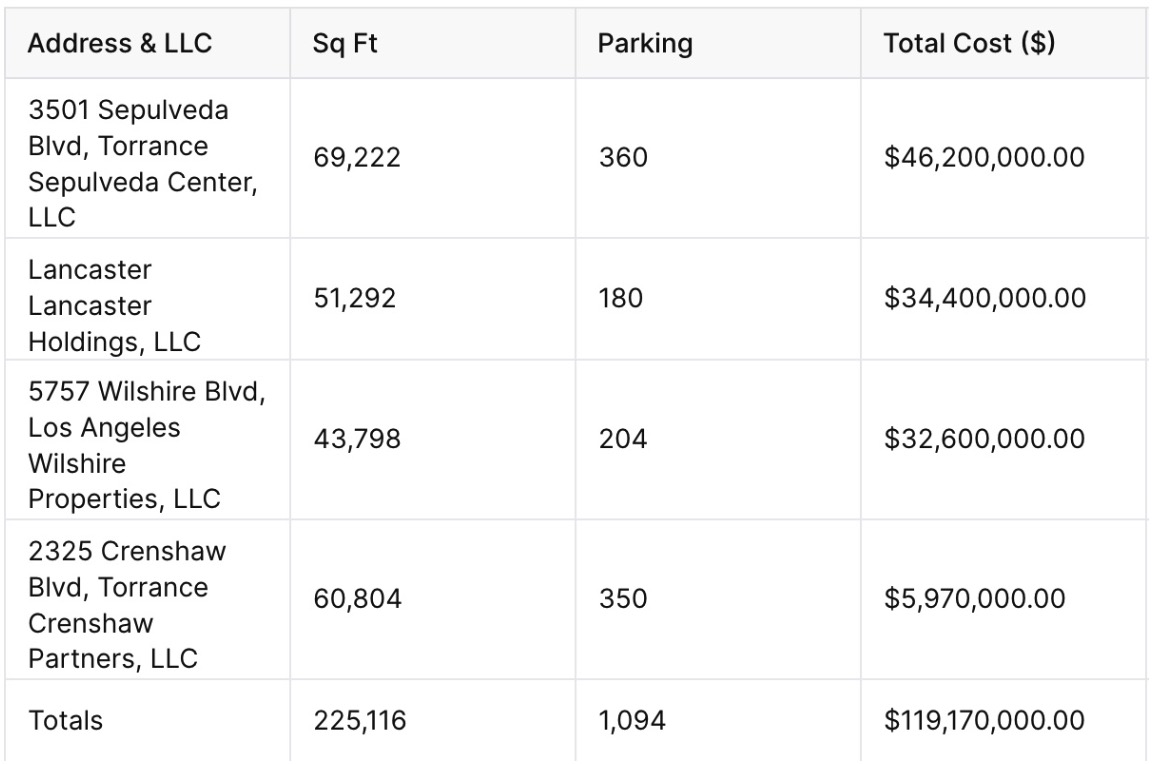
LLCs be sure to thank your Supervisors and the Chair.
Item 21 - A Streamlined Homelessness Plan or More Bureaucracy?
Supervisors Lindsey P. Horvath and Kathryn Barger propose creating a new County department to centralize homelessness services, addressing inefficiencies at LAHSA and aligning with voter-approved Measure A. The plan promises streamlined operations, improved transparency, and better use of funds by transitioning key roles from LAHSA to the County.
Smart Speaker: So we are turning the funds over to the group who has managed the Probation debacle —
Sir, you are off-topic.
While the goal is clarity and accountability, it’s hard to ignore the irony—solving bureaucratic chaos by creating yet another department. The real test will be whether this overhaul delivers results or becomes another expensive layer in the County’s homelessness response.
Your time has expired!
(Eric Preven is a longtime community activist and is a contributor to CityWatch.)












